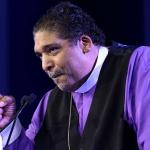Why do I reject polyamory? Am I merely rewarding circuits in my brain? Do I blindly appeal to tradition – marriage should be two people because that’s the way (we pretend) that it has always been? Surely, inasmuch as ethical non-monogamy promotes honesty about sexual behavior between partners, it may well be an improvement over the more blatantly unethical variations of non-monogamy.
Because I do wholeheartedly affirm the love and commitment between same sex partners, I can’t just parrot a line about marriage (and sex) being designed for “one man and one woman.” Still, I am convinced that there’s something to the one and one, that marriage is best kept as a covenant of two. I am still convinced that fidelity means loving the one you’re with – body, mind, and spirit. Yet I feel like I am clinging for dear life at the top of a slippery slope, however vehemently I might despise the thin logic of consequentialism. Conservatives in denominations that are still hashing it out over homosexuality may interpret the current conversation in the United Church of Christ as a specter of what’s to come if they compromise.
Apparently I did not learn my lesson from my first mortifying conversation about polyamory, because I recently brought up the topic with some Christian friends. One shrugged and said, “I tend to think of myself as generally progressive, but honestly: sometimes progressives come up with some whacked-out ideas, this being one of them.” A clergy colleague echoed my own double-edged discomfort; “Every time I try to formulate my argument against polyamory I realize I sound like people did arguing against same-sex marriage 20 years ago. Nevertheless, I continue to believe it’s not quite stable, fair, or truly mutual or faithful.” This resonates with me. In his book The Four Loves, C. S. Lewis suggests that sex creates connections and obligations – connections and obligations that are distinct from those present in our platonic relationships. Is it truly wise to seek the spiritual, physical, and emotional vulnerability of sexual union beyond a covenanted pair?
(At the risk of really sounding like those people who argued against same sex marriage 20 years ago… what about the kids?)
It seems to me that polyamory is both a harder road and an easier road. Non-monogamy is hard because the work of truly honoring the connections and obligations of more than one romantic relationship is no doubt extraordinary. And non-monogamy is easy because it exempts one from the work of true fidelity. When boredom or conflict or changing bodies or a shift in desire cause a monogamous couple’s relationship to fray, the onus is on the two of them to rediscover their passion for the one to whom they have pledged their troth. “Spicing up” your sex life is rarely as simple as Cosmopolitan magazine makes it; the spices that work are creativity and imagination, openness and vulnerability, honesty and perseverance. A non-monogamous couple need not bother going deeper into their union. Why put in extra effort to rediscover the allure of your spouse when you have the latitude to pursue the novelty of a new lover?
I am well aware that my convictions simply won’t fly with some of my liberal friends, just as my convictions that God blesses the love between same-sex couples don’t fly with some of my conservative friends. I won’t demonize polyamorists, but neither, as a pastor, could I in good conscience fetch an extra chair for a pre-marital counseling session. Just as Christians are monotheistic in our religion, we are called to be monogamous in our relationships. No gods before God; no lovers on the side.
 Katherine Willis Pershey is an associate pastor of the First Congregational Church of Western Springs. She is the author of Any Day a Beautiful Change and Very Married: Field Notes on Love and Fidelity.
Katherine Willis Pershey is an associate pastor of the First Congregational Church of Western Springs. She is the author of Any Day a Beautiful Change and Very Married: Field Notes on Love and Fidelity.
















